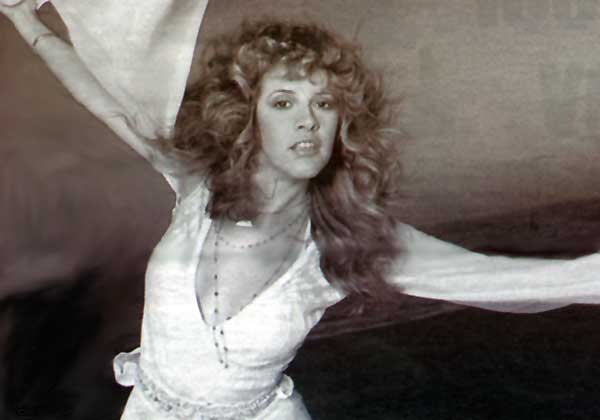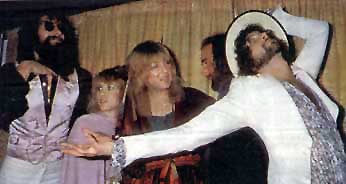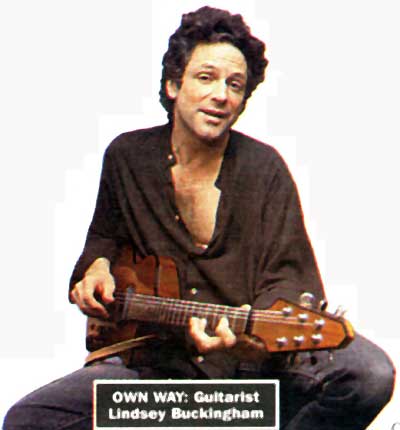|
How
lost love Sold 30 million albums
Sunday Express Newspaper Article
27th October 2003
By drawing on their tangled
relationships, Fleetwood Mac created a legacy of songs that still have meaning
for all of us, says Steve Turner

THERE are a few - a very few - rock bands whose appeal is so strong,
whose achievements are so towering, that they are never forgotten. One such is Fleetwood Mac. It is 25 years
since their seminal album - the 30-million selling Rumours - was released and 12 years since it appeared the band members
had finished working with each other for good. Yet when they got together for a reunion tour
in 1997 they grossed a massive $36million.
So it might seem inevitable that the band should be collaborating on two new ventures.
One is an album of new and original songs, currently being recorded in Bel Air, the other a
Broadway and West End musical based on their crowning glory, Rumours. Inevitably, both ventures are destined to be
huge successes. With any other group, you would expect the members to be promoting
them for all they were worth. That Fleetwood Mac are not tells us a great deal.
It tells us that there is as much hate as love between the band members. So twisted did the
relationships within the band become, and so entwined were the songs they wrote with the
personal battles they were fighting, that there has long been as much pain as pleasure in
playing together.
In what they hoped would remain complete secrecy, drummer Mick Fleetwood, singer/songwriter/guitarist Lindsey Buckingham and
bassist John McVie have been holed up working on new material while singer Stevie
Nicks continued her American solo tour. But she is with them in spirit and on tape,
having handed the team 17 demo recordings for songs she has written. Only pianist and
vocalist Christine McVie - John's ex-wife - is not taking part.
While the new material will be eagerly awaited by fans, it is the story told in the stage
musical that will reveal most about the band. The songs on Rumours form a compelling
narrative. Almost every track on the album is a boast, a rebuke or a word of advice from one
group member to another as their personal relationships broke down. It is a commentary on the marriage between
Christine and John McVie and the long-term partnership of Lindsey Buckingham and
Stevie Nicks. "Probably nine of the 11 songs were written about other
members of the band," admitted Buckingham. "I don't think we realised
how raw they were at the time." Christine McVie once referred to the story
of the band's entangled lives as an "everyday soap opera". Nicks more
precisely called it " a Gothic romance".
Plans for a musical are well advanced. Matthew Vaughn, producer
of Guy Ritchie's current film with Madonna, Swept Away, has joined forces with
with theatre and film impresario Robert Fox to acquire the music rights and find
a writer. Playwright Patrick Marber is in the frame.
The main characters in Rumours: The Musical are well defined.
They are morose heavy-drinking Londoner with a penchant for sailing boats (John McVie); the down-to-earth
Brummie with a background in blues and sculpture (Christine McVie), the egotistical but
sensitive Californian from a wealthy coffee- owning family (Lindsey Buckingham); the
dippy hippy chick in diaphanous dresses (Stevie Nicks); and the elongated English son
of an RAF wing commander (Mick Fleetwood).
SUCH AN incredible story has to start somewhere, and this one begins in 1975, the year Buckingham and Nicks
joined the group and transformed a rather rickety old blues band from England into the epitome of the new
Adult Oriented Rock - smooth, harmonic, easy on the ear and capable of mega sales. The
combination of English eccentricity (Fleetwood in knickerbockers and a pony tail)
and Californian daffyness (Nicks in a top hat and flowing chiffon singing about white
witches) won the band a broad new audience and the first album with this line-up broke all
records for Warner Bros, eventually spawning the hit singles Over My Head, Rhiannon and
Say You Love Me.
Yet, despite the success, the coming disintegration could be sensed. The band was
touring  hard and the pressure was getting to
them. Fleetwood, who had two children, found his marriage on the rocks because of
his long absences from home. hard and the pressure was getting to
them. Fleetwood, who had two children, found his marriage on the rocks because of
his long absences from home.
John McVie had been taking to the bottle and the person who emerged from
these sessions was not to his wife's liking. His behavior became intolerable and in the middle of the
tour Christine separated from him after seven years of marriage. "I was aware of it being rather
irresponsible," she admitted. "I had to do it. It was either that or me ending up in a lunatic
asylum."
Stevie Nicks had become the face of Fleetwood Mac. Her bee-stung lips, baby eyes and
tumbling hair were the stuff of album covers and wall posters. Her on-stage dancing
distracted from the serious and rather static approach of the other group members.
The one person who found this hard to take was her lover of the past five years,
Lindsey Buckingham. He had wanted her to be his muse, not a pin-up girl. At first he felt twinges of
jealousy but this soon hardened into resentment. Nicks, on the other hand, emboldened by the public
recognition she was getting, summoned up enough courage to tell Buckingham to get himself a
life without her.
It bothered Lindsey when the audience went crazy for me," she told a journalist "He
thought that I, being his girlfriend, was acting too sexy. on stage with my
dancing But I liked doing that. l had to tell him that I couldn't be his
Stevie when I was up there. I would never have dreamed of telling him how
to act on stage.
It was in February 1976 that things boiled over The band was in a small windowless studio in
Sausalito, a few streets away from the waters of San Francisco Bay,
recording Rumours. The McVie's could barely look each other. Nicks resented the fact that her songs
had to be arranged by Buckingham who could exact punishment on her simply by doing a bad
job, or not doing a job at all. Fleetwood half in love with Nicks himself but disciplined enough
to put business before pleasure, had the unenviable task of coaxing creativity
out of the emotional chaos.
Things got worse. Fleetwood's wife Jennifer requested a divorce.
Nicks took up with Don Henley of the Eagles. Christine McVie began an affair with
Curry Grant, Fleetwood Mac's lighting engineer. The members of the group were uncomfortable
being with each other but also knew that they would make things even worse if they tried to
bring their new lovers into the circle They tried healing their wounds through liberal
doses of marijuana, cocaine and alcohol.
WHEN Nicks, Buckingham and Christine McVie began writing songs, each found that the
words they were coming up with were messages to their spouses "There were these
dialogues shooting from member to member as Buckingham put it. "They really crackled on
the record. He wrote Second Hand News as a comment on the Nicks-Henley romance.
" I could see it coming," he said "I thought it would bum me out but it was a good
thing to see her with him. It made mc happy I thought there was something to
fear, but there wasn't."
Nicks barbed response was Dreams, a song in which she taunted Buckingham about
having given him the freedom he wanted "You say you want your freedom/ Well who am I to
keep you down" Buckingham hit back with Go Your Own Way, containing the
memorable put-down line: "Shacking up is all you wanna do." Thirty-fifteen
to Buckingham.
As tracks were played back there were clenched teeth and averted eyes in the control
room. "We were trying to speak to each other in a civil way, while
listening to each other's shattered relationships." Nicks admitted.
"It was very, very tense." She was furious when she heard Go Your Own
Way for the first time. "I very much resented him telling the world that
'shacking up' with different men was all I wanted to do. He knew it wasn't true.
It was just an angry thing that he said.
John McVie was visibly shaken when he first heard You Make Loving
Fun, his wife's celebration of her affair with Curry Grant. "I got a lump in my throat," he later
admitted. "Especially sitting
there with the person that wrote it right next to you." John McVie was still desperately in love with his
wife but she reckoned he'd had too many chances to reform. "He hasn't really been a
happy man since I left him," she told Rolling Stone journalist Cameron Crowe. "I could
make him a happy man tomorrow by telling him that I'd come back. But then I would be miserable. I'm
not that unselfish."
Her advice to her husband was blunt. He should stop wallowing in the past and what
could have been and start looking to the future. She put her thoughts into a song
called Don't Stop which, 16 years later; becoming the campaign song for Democratic presidential candidate
Bill Clinton: "'Don't stop thinking about tomorrow/ Don't stop, it'll soon be
here/ It'll he better than before/ yesterday's gone, yesterday's gone."
All those millions of fans who love Fleetwood Mac will be hoping that, in getting together
in middle age, the band can finally heal the wounds they inflicted on each other a
quarter of a century ago, and that the story told in Rumours call be laid to rest.
Perhaps, as Stevie Nicks sang, yesterday can be forgotten, but those songs will resonate
as the world falls in and out of love
|



 hard and the pressure was getting to
them. Fleetwood, who had two children, found his marriage on the rocks because of
his long absences from home.
hard and the pressure was getting to
them. Fleetwood, who had two children, found his marriage on the rocks because of
his long absences from home.